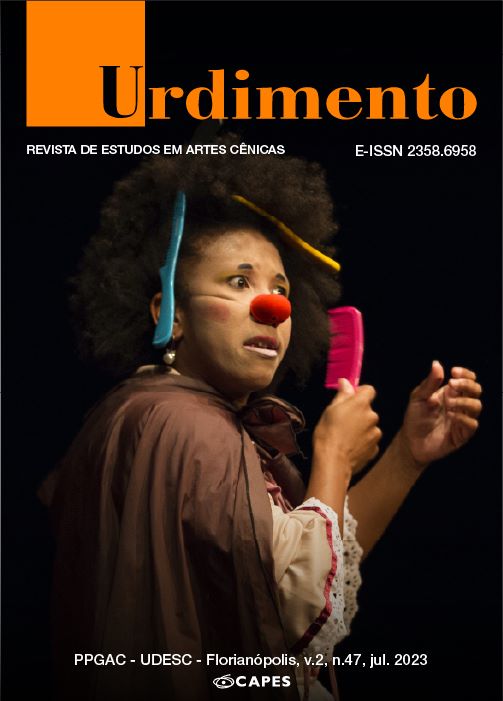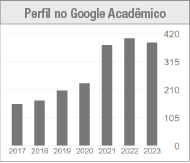Un espejo sin reflejo: La Mancha Violeta en la crítica teatral brasileña
DOI:
https://doi.org/10.5965/1414573102472023e0201Palabras clave:
La Mancha Violeta, Teatro brasileño moderno, Crítica Teatral, SIDA, Plínio MarcosResumen
En este artículo discutimos las diferentes metáforas utilizadas por la recepción crítica de la obra A Mancha Roxa de Plinio Marcos, para buscar su sentido en el Brasil de fines del siglo XX, acercándonos a las principales claves de lectura del texto y del espectáculo en la mirada de algunos de los principales críticos teatrales brasileños em el momento de su puesta em escena. En la obra, el autor retoma el tema de la vida em prisión a partir de los conflictos de un grupo de mujeres, optando también, esta vez, por el enfoque del sida. Para ello, partimos de la discusión de Susan Sontag, para comprender el alcance más general del problema planteado por su reflexión, por la crítica de la obra y del espectáculo.
Descargas
Citas
ABREU, Wagner Coriolano de. Quando o teatro encena a cadeia: e recepção da dramaturgia de Plínio Marcos. São Leopoldo: Editora Unisinos, 2001.
CARDOSO, Luiz Carlos. Drama sufocante no Bexiga. Visão, 29 mar. 1989. Disponível em: https://www.pliniomarcos.com/criticas/mancha-roxa-luizcarlos.htm. Acesso em: 17 fev. 2021.
DE MAN, Paul. Alegorias da leitura: linguagem figurativa em Rosseau, Nietzsche, Rilke e Proust. Rio de Janeiro: Imago Ed., 1996.
DEL RIOS, Jefferson. A mancha roxa, um efeito devastador. O Estado de São Paulo, 21 mar. 1989. Disponível em: https://www.pliniomarcos.com/criticas/mancha-roxa-jefferson.htm. Acesso em: 17 fev. 2021.
GARCIA, Lauro Lisboa. Plínio Marcos, atrás das grades. O Estado de São Paulo, São Paulo, 12 mar. 1989.
GUZIK, Alberto. Com o impacto de um soco: em A mancha roxa, Plínio Marcos mostra que está em plena forma e com muita emoção. Veja, 9 jul. 1989. Disponível em: https://www.pliniomarcos.com/criticas/mancha-roxa-albertoguzik.htm.
Acesso em: 17 fev. 2021.
HOLLANDA, Heloisa Buarque de (org.). Cultura e desenvolvimento. Rio de Janeiro: Aeroplano, 2004.
MAGALDI, Sábato. Depois do espetáculo. São Paulo: Perspectiva, 2003.
MAGALDI, Sábato. Moderna dramaturgia brasileira. São Paulo: Perspectiva, 1998.
MAGALDI, Sábato. Panorama do teatro brasileiro. São Paulo: Global, 1997.
MARCOS, Plínio. A mancha roxa. In: PÉCORA, Alcir (org). Plínio Marcos: obras teatrais, v.1. Atrás desses muros. Rio de Janeiro: Funarte, 2016.
MARTINS, Cláudio Luis Serra. Desmanchando preconceitos: a AIDS e a estética da mancha nas peças Angels in America, O Homem e a mancha e A mancha roxa. Tese (Doutorado em Letras) – Universidade Estadual do Rio de Janeiro, Rio de Janeiro, 2009.
MOSTAÇO, Edélcio. Crônicas de um tempo mau. In: MAIA, Fred; CONTRERAS, Javier Arancibia; PINHEIRO, Vinicius. Plínio Marcos: a crônica dos que não têm voz. São Paulo: Boitempo, 2002. p. 12-13.
PARANHOS, Kátia Rodrigues. Plínio Marcos: entre o feminino e o masculino no Brasil pós-1964. Urdimento: Revista de Estudos em Artes Cênicas, Florianópolis, v. 2, n. 21, p. 76-84, 2013. Disponível em: https://doi.org/10.5965/1414573102212013076. Acesso em: 26 jul. 2023.
PRADO, Décio de Almeida. O teatro brasileiro moderno. São Paulo: Perspectiva, 2009.
PRADO, Décio de Almeida. Exercício findo. São Paulo: Perspectiva, 1987.
PÉCORA, Alcir. Atrás desses muros. In: PÉCORA, Alcir (org). Plínio Marcos: obras teatrais: atrás desses muros. Rio de Janeiro: FUNARTE, 2016.
SARRAZAC, Jean-Pierre. Poética do drama moderno e contemporâneo: de Ibsen a Koltès. Trad. Newton Cunha, J. Guinsburg e Sonia Azevedo. São Paulo: Perspectiva. 2017.
SARRAZAC, Jean-Pierre et al. Léxico do drama moderno e contemporâneo. Trad. André Telles. São Paulo: Cosac Naify, 2013.
SERAFIM, Lucas de Souza. O cárcere feminino em cena: representações da Aids em A mancha roxa, de Plínio Marcos. Revista de Psicologia da Unesp, [s. l.], v. 8, n. 2, 2019. Disponível em: https://revpsico-unesp.org/index.php/revista/article/view/80. Acesso em: 26 jul. 2023.
SONTAG, Susan. Doença como metáfora/Aids e suas metáforas. Trad. Rubens Figueiredo e Paulo Henrique Britto. São Paulo: Companhia das Letras, 2007.
Publicado
Cómo citar
Número
Sección
Licencia
Derechos de autor 2023 Urdimento

Esta obra está bajo una licencia internacional Creative Commons Atribución 4.0.
Declaración de Derecho de lo Auctor
Los artículos publicados por la revista son de uso gratuito. Los derechos de autor son todos cedidos a la revista. Los artículos cuyos autores son identificados representan la expresión del punto de vista de sus autores y no la posición oficial de la revista Urdimento. El autor o los autores se comprometen a que publiquen material referente al artículo publicado en la Revista Urdimento mencionar dicha publicación de la siguiente forma:
"Este artículo fue publicado originalmente por la revista Urdimento en su volumen (poner el volumen), número (poner el número) en el año de (poner el año) y puede ser accedido en: http://www.revistas.udesc.br/index.php/urdimento
Este periódico utiliza una Licencia de Atribución Creative Commons - CC - BY 4.0.



